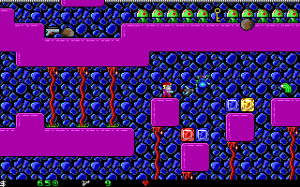Crystal Caves 
Game genres tend to be hard to separate, with the blurry lines between categories often not worth arguing. Is Mass Effect an RPG or a shooter? Does it matter? Genre terms probably find the most use as ways to discuss structure since, generally, we recognize what we’re getting into when we’re told that we’re going to play an adventure game or a fighting game. Even then, the chances of taking elements from multiple columns are high enough to render the exercise pointless.
Case in point: Crystal Caves, one of Apogee Software’s last games before they found massive success with Duke Nukem. Crystal Caves is the sort of extra-difficult platformer that begs you to repeat stages dozens of times before you complete them, god forbid with the highest possible score. It has a unique pace that encourages forethought over action. It shares more DNA with Chip’s Challenge than Mario.
Crystal Caves was released as a shareware trilogy, with each episode amounting to level pack with a new, minimal plot. You play as down-on-his-luck space miner Mylo Steamwitz as he travels from planet to planet in the Millennium Kiwi in search of a way to pay off his latest expenses. The plot for each episode exists solely to set up the gameplay conceit: your goal is to collect every last crystal from the 16 stages in each episode. You can jump between them via an overworld-type area, but you either have to finish a stage completely in one shot or save it for later.
Each stage is usually quite difficult. Obstacles and hazards abound — hidden spikes, airlocks, monsters, sentient minecarts, living rocks, turrets, toxic goo, and the like — and you can only take three hits before doing down. Crystal Caves is a fairly slow and blocky game, so dodging enemies is difficult or sometimes out the question. You’ll often have to turn to your gun to take them out, but you have a limited number of shots. A wasted rocket can often curse you unless you have access to the extra ammo scattered around the stage. Some enemies create particularly troubling risk-reward scenarios. Snakes, for instance, leave dangerous corpses behind when they die, while the flying slime creatures can often be avoided rather than killed.
The margin for error is thin, especially for a platformer. This puzzle-esque gameplay permeates Crystal Caves. Some puzzle elements are obvious, such as the many levers that operate death traps and moving platforms. But even the powerups can’t escape this gameplay style; temporary super-weapons and gravity reversal only appear when they need to be used in specific places. Bonus items present the same give-and-take as enemies too. These odd-colored eggs found throughout the game can give up to 1000 points on their own, but shooting them can potentially give you even more points down the road if you destroy enough of them. Treasure chests too require a good deal of backtracking that may not be worth the potential harm.
You could approach this from two angles. If you treat Crystal Caves like an action-platform game, the strict paths to victory might be discouraging. Compare this game to Super Mario World in which you can complete stages with any number of powerups through a variety of alternate routes. By comparison, Crystal Caves wants you to kill certain enemies, fire your gun on this spot, and hit every lever. However, taken as a puzzle game, the platforming elements are a breath of fresh air. Here is a game that successfully marries the solution-based structure of puzzle games with the faster jumping action from the platform genre. Successfully completing a level feels rewarding, more so if you managed to collect some bonus points.
Crystal Caves is a fun game regardless of how you classify or label it. Of all the EGA DOS games, this one has aged better than most. It looks and feels inviting in ways that few similar games do, and the cute-sy exterior takes a bit of the edge off the difficulty. It is a hard game, and it’s different, but Crystal Caves offers a healthy, small dose of DOS unorthodoxy.



Crystal Caves predate Secret Agent, a platformer on the same engine and the same three episode structure. Although much easier, Secret Agent is just as fun and well made. Highly recommended.